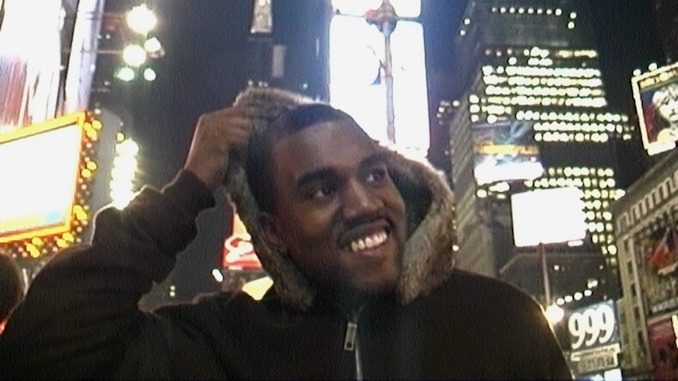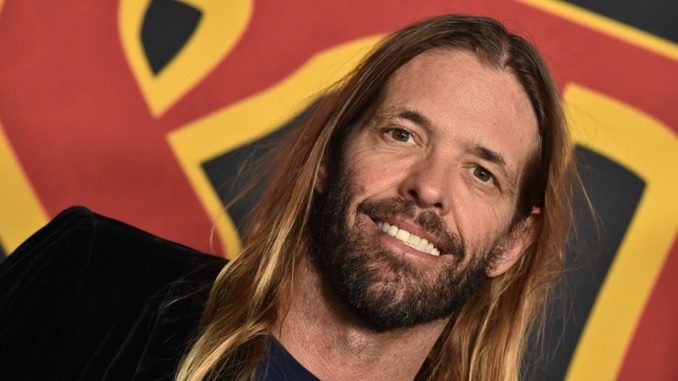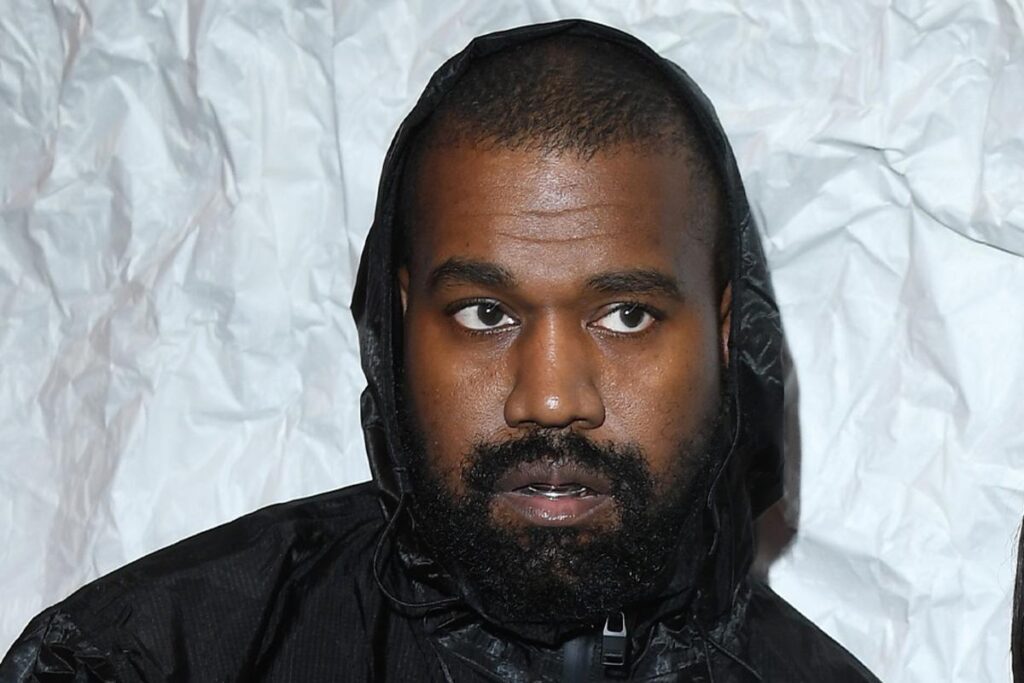Directed by filmmakers Chike & Coodie, and produced in collaboration with Leah Natasha Thomas, Netflix’s Jeen-Yuhs: A Kanye Trilogy is a three-part documentary focusing on Kanye West’s rise in the hip-hop industry, the controversies he’s courted during his time in the spotlight, and the long shadow cast on his career by his mother’s death in 2007. Jeen-Yuhs is about the subjective creative experience of documenting an artist’s rise close-up before being forced to watch that artist in their own whirlwind from afar, contrasting the endearing young Kanye with the enigmatic older Kanye, while seldom articulating criticisms. There is concern, but never condemnation.
Jeen-Yuhs begins its first installment, “Act I: Vision,” with Coodie Simmons explaining how he came to know Kanye and be invited by him to New York to document his rise, demonstrating the collective journey of Kanye and his collaborators to elevate Chicago’s status in the national rap scene while bridging the artistic gap between the Mos Def/Talib Kweli style of Rawkus Records and the Jay-Z/Dame Dash style of Roc-A-Fella. The series proceeds through its second episode, “Act II: Purpose,” to highlight the dues paid and delayed gratification Kanye experienced on his way to creating a debut solo album that won him 2 Grammys (amid 3 total wins and 10 nominations that year), fully documenting Kanye’s doubters—including the people running his label—before his triumphs. Chike Ozah is introduced as a collaborator during the run-up to the release, helping Coodie and Kanye make the videos for “Through the Wire” and “Jesus Walks.”
Jeen-Yuhs also goes on to accentuate why the echoes and ripples of the death of Kanye’s mother lasted for more than a decade. Donda West is presented as Kanye’s rock, his grounding element and closest advisor. Complementarily and conversely, Jeen-Yuhs never shows any other interpersonal relationships particularly closely, neither platonic nor romantic. Don’t expect insight into Amber Rose or Kim Kardashian. Accept instead a look into his creative process, and the special magic of seeing those early recording sessions with the likes of Chicagoan artist Tarrey Torae and poet J. Ivy, the latter of whom performed on “Never Let Me Down” and co-wrote the Jeen-Yuhs narration script with Coodie.
The documentary has a few issues though, primarily a pacing problem. In a three-part documentary covering 20+ years, I expected the 4.5 hours of running time to be divided roughly equally among three periods: the ‘90s and early 2000s, mid 2000s to mid-2010s, and late 2010s to today. But circumstances around the filming led to something very different.
Kanye West initially conceived of this documentary in 2002 to cover the lead-up to the release of his first album. Coodie was ready to put it out after Late Registration in 2005, but Kanye didn’t want the documentary released, telling Coodie he wasn’t ready for the world to see the real him because now he was acting and playing a role. Therefore, Jeen-Yuhs ends up with a little over three hours of the final series covering the period between Kanye being interviewed by Coodie on Chicago’s Channel Zero TV in 1998 and Kanye winning the award for Best Rap Album at the 2005 Grammys. Around 90% of that is focused on the period between 2002 and 2004, with about an hour and a half covering the time between the release of Late Registration and the 2021 Donda release show at Mercedes-Benz Stadium in Atlanta.
Therefore, within “Act III: Awakening,” there are a lot of soundbite clips that show up briefly but aren’t explored. The interviews that frame many documentaries aren’t here, so viewers will see Kanye say “George Bush doesn’t care about Black people” during the Hurricane Katrina relief telethon and watch Mike Myers and Chris Tucker react in hilarious appall, but don’t hear more from Kanye about that. We see Taylor Swift and Beyoncé react to his antics at the VMAs, but not his own response to the fallout. But perhaps moments like that have been litigated enough in the court of public opinion. All told, Jeen-Yuhs’s third act moves at a breakneck pace until briefly stopping in 2014, when Common invites Coodie to document his first festival back in the city where Kanye will be a surprise guest—but Kanye doesn’t talk to to the filmmaker. Then it jumps to Kanye showing Coodie love when he’s recording at the The Life of Pablo release party, and inviting Chike & Coodie to follow during his globetrotting process of building up the Yeezy clothing line while working on Jesus Is King, KIDS SEE GHOSTS, and later Donda.
Basically, what the documentary shows rather than tells is that Kanye suffered greatly after his mother died, including pushing away a close friend and collaborator who was his documentarian. Perhaps Coodie reminded Kanye too much of past vulnerabilities, or after asking for cameras to follow him for so long Kanye became inundated and frustrated by them. The oddest part is that, with GLC inviting Coodie to a recording session and Common inviting him to film Kanye at a festival in Chicago, that other people in Kanye’s close personal/professional circle thought Coodie was trustworthy enough to have around. They were right to trust him, because he certainly knows when to turn the camera off—as he does with some frequency in the back end of “Act III,” attempting to protect Kanye’s image from his own rants.
“Act III: Awakening” also has a bit of a disjointed nature because, rather than just show news clips of Kanye being tracked by the paparazzi and discussed by talking heads, Chike & Coodie intersperse the visual collage with home videos of Coodie’s daughter (contrasting divergent life paths) and clips from a cartoon adaptation of Jonathan Swift’s Gulliver’s Travels—a callback to Donda telling Kanye in “Act I” that “a giant looks in the mirror and sees nothing,” as a way of encouraging his confidence and humility.
It would be difficult to replace the segment dedicated to this combination of clips, home videos, and symbolic cartoon excerpts with something more substantial, though. There’s nothing to be done about the fact that, more than 15 years ago, Kanye decided he didn’t want the documentary to come out, or that he excluded his hand-picked documentarians from his life for more than a decade. The intimate framing of the series dictated that once they were separated from their subject, the piece lost creative steam only replaceable through reconnection.
Consequently, there’s no space or time to explore Kanye’s professional relationship with Jay-Z or the controversy of multiple former collaborators (Consequence, GLC, Talib Kweli) claiming he has ghostwriters, which Kid Cudi corroborated during a tense period in their relationship between The Life of Pablo and KIDS SEE GHOSTS. Once reunited with Kanye, Chike & Coodie portray the joy he seemed filled with as Jesus Is King was coming together in contrast to the apparent mental health crisis that coincided with the 2020 presidential campaign and the release of Donda.
Overall, Jeen-Yuhs succeeds in elucidating Kanye’s journey to stardom, though ultimately its intimacy feels professional rather than personal. The documentary is valuable to audience members who want to know more of the details behind the stories he tells on the last track of The College Dropout, “Last Call,” and learn more about his close relationship with his mother. For fans, listeners, and viewers who want insight into the last half-decade of Kanye’s public mishaps, there’s a little there, but not a lot. For those who want to know in detail about the transformation from The College Dropout Kanye to The Life of Pablo Kanye or the personal relationships behind the music, the docuseries leaves much to be explored. It feels much more like a success than a failure, but also wasn’t what I expected. As such, it is fittingly Kanye, but it also means the final word is yet to be written—not just on the artist’s life, but also on the period the documentary purports, or is forced, to portray.
Jeen-yuhs: A Kanye Trilogy premieres February 16th on Netflix, with segments released weekly.
Kevin Fox, Jr. is a freelance writer and former Paste intern. He loves videogames, film, history, pop culture, sports, and human rights. He can be found on Twitter @kevinfoxjr.
For all the latest TV news, reviews, lists and features, follow @Paste_TV.




